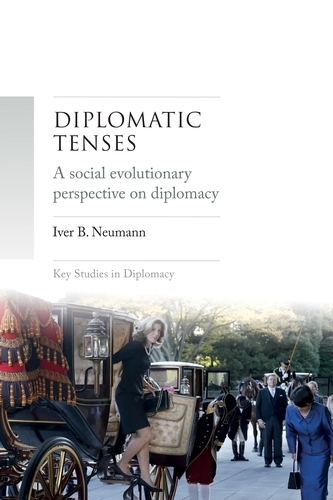
Diplomatic Tenses: A Social Evolutionary Perspective on Diplomacy
(Hardback)
Publishing Details
Diplomatic Tenses: A Social Evolutionary Perspective on Diplomacy
By (Author) Iver Neumann
Manchester University Press
Manchester University Press
27th November 2020
United Kingdom
Classifications
Tertiary Education
Non Fiction
International relations
Politics and government
327.209
Physical Properties
Hardback
144
Width 156mm, Height 234mm, Spine 10mm
381g
Description
Offering an alternative and a complement to existing histories of diplomacy, this book discusses change in the form of 'tipping points', which it understands as the culmination of long-term trends. Part I discusses social evolution on the general level of institutions. It argues that in cases where a diplomatic institution's tipping points are defined by the types of entities that make it up, the consular institution has evolved from concerning polities of independent traders to becoming ever more of a state concern. Part II challenges the existing literature's treatment of diplomacy as an elite, textual affair. It lays the groundwork for studying visual diplomacy and observes that the increasingly marginal vision of diplomacy as a confrontation between good and evil survives in popular culture. The book concludes by identifying the future of diplomacy as a struggle between state-to-state based diplomacy and diplomacy as networked global governance. -- .
Reviews
Can Iver Neumann add something new to his already impressive uvre on the history and practices of diplomacy Yes, he can: by analysing the history of diplomacy in terms of its social evolution. This book is a must-read not only for students of diplomacy but for anyone interested in the innovative uses of evolutionary thought in the field of international relations.
Mathias Albert, Professor of Political Science, Bielefeld University
Thought-provoking and innovative, this book introduces a social evolutionary account of diplomacy that spans several hundred thousand years. Neumann forcefully challenges a research field that has increasingly turned to micro-level and ethnographic examinations of diplomatic sites in no small part due to Neumanns own earlier interventions. Diplomatic tenses raises fascinating questions about the value of very longue dure analyses, pre-historic archaeological data, the concept of tipping points and functionalist arguments for diplomatic studies.
Ann Towns, Professor of Political Science, University of Gothenburg
'Neumann has staked out a path useful for scholars wishing to experiment with how variable such as population growth, increasing sea levels, and the current COVID-19 pandemic may affect or change diplomacy.'
The Hague Journal of Diplomacy 17 (2022)
Author Bio
Iver B. Neumann is Director of The Fridtjof Nansen Institute, Norway
